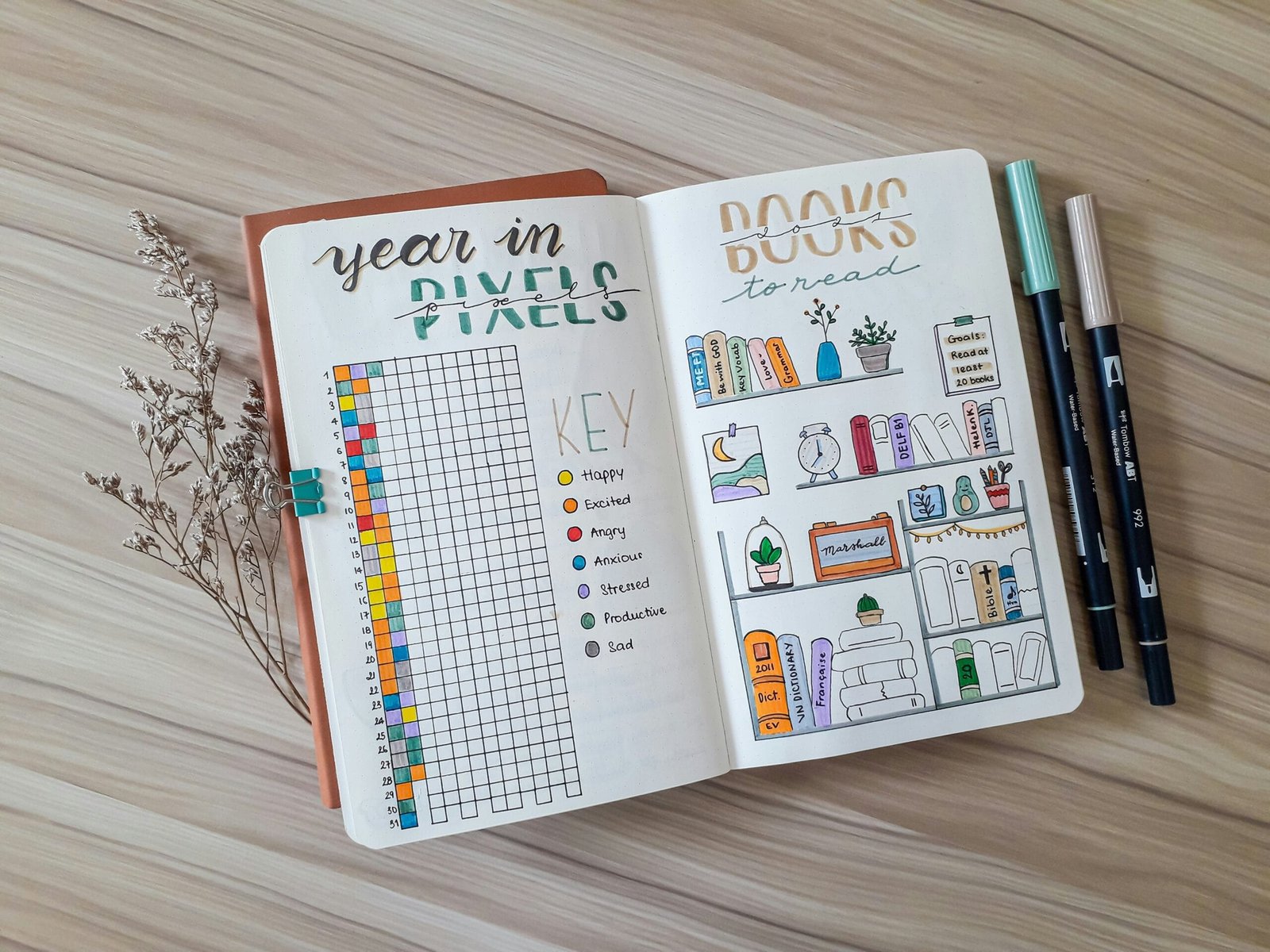Understanding the Connection Between Journaling and Mental Health
Journaling can feel like that quiet moment of exhale at the end of a long day—a personal check-in, a safe space to unload, and a chance to just be with your thoughts. It’s more than writing things down. It’s a way to process what’s going on inside, find a little clarity, and give your mind some breathing room.
Over time, journaling has proven to be a gentle yet powerful tool for mental health. It can ease anxiety, lift your mood, and help you reconnect with yourself when life feels loud or overwhelming. There’s no one way to do it. You can tailor your journaling practice to your personality, your schedule, and whatever your heart needs most in the moment.
Why Journaling Helps Your Mood (and Calms Anxiety)
Most of us are juggling a lot in our day-to-day lives, and when our minds are constantly racing, journaling gives us a moment to slow down, check in, and untangle the mental mess.
There’s actually research behind this. Studies show that journaling can lower levels of anxiety and stress and even improve your overall mood. When we write things down, we’re doing more than venting. We’re organizing thoughts, noticing patterns, and working through emotions. It becomes a form of emotional release, kind of like taking the lid off a pressure cooker.
Here’s what makes journaling so helpful:
It lets you release what’s been building up inside
It brings you into the present, grounding you in the here and now
It helps you understand yourself, your triggers, your wins, your worries
Whether you’re pouring out your feelings, writing down things you’re grateful for, or simply tracking your habits, it all helps you feel a little more in control and a little less alone with your thoughts.
5 Journaling Styles to Support Your Mental Health

Journaling isn’t one-size-fits-all. Some days you might want structure, other days you might need a blank page to let it all out. Here are a few styles to explore. You can try one, try them all, or mix and match depending on your mood:
1. Expressive Writing: Let It All Out
This one’s raw, honest, and unfiltered. It’s your brain on paper, no edits, no judgment. It’s just you releasing your innermost thoughts and saying what needs to be said.
Why it helps: Writing freely about what’s bothering you gives your emotions somewhere to land. Over time, it brings clarity and can help you work through hard stuff.
Try this: Start with a prompt like “What’s been weighing on me?” and write for 10–15 minutes without stopping. Let it flow, even if it’s messy.
2. Gratitude Journaling: Finding the Good
Think of this as collecting tiny moments of joy, little reminders that not everything is heavy.
Why it helps: Gratitude shifts your focus from stress to appreciation. Even noticing one small, good thing can change the tone of your day.
Try this: At the end of each day, write down three things you’re grateful for. Big or small, it all counts.
3. Bullet Journaling: Organize with Intention
This one’s part planner, part journal. It’s where mindfulness meets structure.
Why it helps: Bullet journaling helps you track patterns like mood swings, sleep habits, or anxiety triggers so you can respond with more awareness.
Try this: Create a simple spread for the week. Include habit trackers (like hydration or bedtime), daily reflections, or a mood log. Keep it simple, or add colors and doodles if that feels good.
4. Visual Journaling: When Words Aren’t Enough
Sometimes emotions need a shape, a splash of color, or a swirl of lines. Visual journaling gives you the freedom to express what’s hard to say.
Why it helps: It taps into a different part of the brain. Doodling, collaging, or painting your feelings can help you process them in new, powerful ways.
Try this: Choose a color that matches your mood and create something with it—no rules, just expression.
5. Stream-of-Consciousness: Unfiltered Flow
This is the most freeing form of journaling. No structure, no purpose, just writing whatever comes to mind.
Why it helps: It helps you notice thoughts you didn’t even realize were there. It’s a release, a brain dump, and a way to clear space for calm.
Try this: Set a timer for 5 minutes. Start with “Right now I feel…” and let your pen do the rest.
Need Help Getting Started? Use a Prompt
Prompts are great when your brain is tired and you just don’t know what to say. They give you a soft nudge and a place to begin.
9 Mood-Boosting Prompts
These are perfect for lifting your spirits and inviting more positivity into your day.
What am I grateful for today?
Describe a recent accomplishment, big or small, that made me proud.
What’s one happy memory I always come back to?
Who do I admire and why?
List five little things that made you smile this week.
How can I take care of myself today?
What are three dreams I’m excited to chase?
What’s one compliment I’ve received that still makes me smile?
What are three qualities I genuinely love about myself?
These prompts gently remind you of the light in your life, especially helpful on the days that feel heavy.
6 Anxiety-Soothing Prompts

Use these when your mind feels cluttered or your chest feels tight.
What’s causing me stress right now, and how or where is it showing up in my body?
What positive affirmations do I need to hear today?
Describe a recent moment of anxiety. What helped me cope?
What strategies have worked for me in the past when I felt anxious?
Imagine your day without anxiety. What would it look and feel like?
How can I prioritize rest and self-care this week?
Writing about your worries makes them feel a little more manageable. You’re not bottling them up, you’re releasing them with patience and compassion toward yourself.
How to Make Journaling a Habit
You don’t need fancy tools or an elaborate ritual. Here’s how to make journaling work for you:
Pick a time that feels right. Some people journal with morning coffee, others prefer winding down at night.
Create a cozy space. Light a candle, grab a blanket, or head outside. Make it inviting.
Keep expectations low. Just one sentence counts. A list counts. A messy brain dump counts.
Stay consistent-ish. You don’t have to journal every single day, you just need to keep it a habit enough to notice the benefits.
Reflect sometimes. Every now and then, flip back through past pages and see how far you’ve come.
Most importantly, be kind to yourself. Journaling is an act of self-care.
What You Might Start Noticing
Once you begin journaling regularly, even if it’s just a few times a week, you may start to notice:
Your thoughts feel clearer and less tangled
Emotions become easier to name and understand
You start celebrating small wins more often
Your self-talk becomes a little softer
You feel more grounded in your everyday life
Little by little, journaling helps you center yourself and feel at home with your thoughts.
Final Thoughts
At the heart of it, journaling is about connection. It’s connecting with your thoughts, your feelings, your dreams, and the quiet parts of you that don’t always get a voice.
So if you’ve been feeling anxious, overwhelmed, or just out of sorts, try putting your pen to paper and start journaling. Let it be messy. Let it be real. Let it be yours.
Disclaimer: Content related to journaling, meditation, or emotional well-being is intended for informational and inspirational purposes only. It does not replace professional mental health care, therapy, or counseling. If you are struggling with mental health issues, please seek help from a licensed mental health professional.

